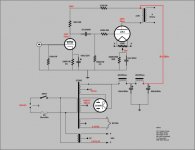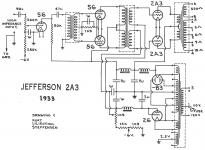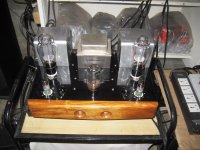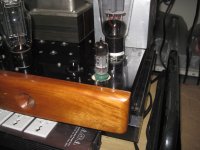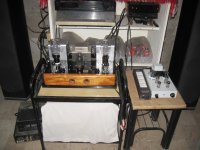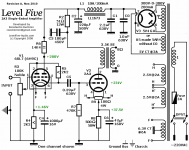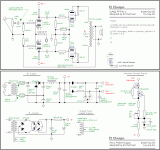Here is another schematic with Power supply using a choke IP.
The nice thing about the ECC99 driver its higher GM and Low Rp and for this application it's ideal.I don't know if you are gunho on octals but the ECC99 and the 6H30 and the 5687 are all marvels IMHO.
The nice thing about the ECC99 driver its higher GM and Low Rp and for this application it's ideal.I don't know if you are gunho on octals but the ECC99 and the 6H30 and the 5687 are all marvels IMHO.
Attachments
I have reviewed many of the drawing on this site and elseware, yet have not seen one using these tubes as drivers.
The attached circuit is indeed PP, but so what? It is so much better than 99% out of all "modern" 2A3 circuits that it's not even funny.
Attachments
I hear you on that..PP has much lower 2nd order harmonic distortion and it's my favorite.This last pair of SET amps I got I traded for a pair of Dyna Mk3s I upgraded with VTA boards using 12Bh7s and a partial film cap supply..The amps I got are the Da Lites and they use an all film cap supply with a 5687 driving a 310a into a 300b and they really have the dynamics of PP amps in their power rating. They make 17 watts on measurement and if I use a KR 300bxl they will make more yet. I'm push/pull vintage guy tho..Give me a Citation 2 or an Mc275 or a pair of Mc60s any day.
this is my recent 2A3 rebuild, used the 26 dht driver before and now i replaced with 12HL7...
the owner wanted more oomph, so i removed about 10lbs of chokes and traffos. replaced the OPT's with Tango copy locally would OPT's.....beefed up the psu filtering...
the owner wanted more oomph, so i removed about 10lbs of chokes and traffos. replaced the OPT's with Tango copy locally would OPT's.....beefed up the psu filtering...
Attachments
I have been looking at the 12hl7 as well. Is it used as a pentode or triode? Actively or passively loaded?
Decision
Hi All,
Thanks for all your help. For several reasons I need to get this amplifier right the first time. I have tentatively decided to make the Level 5 2A3 and lose the 56 triodes.
Any thoughts good or bad on this circuit? I know some voltages will need to change if I use the 6SN7 suggested in this thread. Would that be worth doing over the 6SL7 used in the design as depicted. I will start a build thread if anyone is interested.
Thanks for your help!
Ron
Hi All,
Thanks for all your help. For several reasons I need to get this amplifier right the first time. I have tentatively decided to make the Level 5 2A3 and lose the 56 triodes.
Any thoughts good or bad on this circuit? I know some voltages will need to change if I use the 6SN7 suggested in this thread. Would that be worth doing over the 6SL7 used in the design as depicted. I will start a build thread if anyone is interested.
Thanks for your help!
Ron
Attachments
If you use a 6SN7 with that design the gain wouldn't be enough to drive the 2A3. The thing with an SRPP is it can dri e heavy loads, why not optimize the stage to drive a 10k load and reduce the 2A3's grid resistance to 10k and go with the battery bias as initially intended?
I have tentatively decided to make the Level 5 2A3 and lose the 56 triodes.
Even with SRPP, asking a high RP/low gm 6SL7 to drive a 2A3's Miller capacitance is (IMO) asking for trouble. Like its Noval relation, the 12AX7, the 6SL7 can't fight its way out of a wet paper bag. OTOH, the 6SL7 is an excellent high μ voltage amplifier. Again, a MOSFET buffer solves the problem. Given the 6SL7's wimpy nature, the FET to use is the ZVN0545A, as its capacitances are tiny. I strongly suggest you go with FET buffered, common cathode, small signal circuitry. A single twin triode will serve in a stereoblock amp.
If, like many members (including yours truly), you are financially constrained, you can save a fair amount of cash by employing the voltage doubler B+ PSU used in "El Cheapo". High performance at modest expense is (IMO) nothing to sneer at.
Another way to save money is using the 7F7, which is the Loctal equivalent of the 6SL7. Loctal tubes are a good way to obtain quality NOS at reasonable cost.
There is very little new under the sun in tubed circuitry. In a number of ways, building is like ordering from a neighborhood Chinese restaurant. "Pick 1 from column A and 2 from column B."
Attachments
Music detail differences is huge, after change from ecc83-->81
Driver should have some muscles. 62k ra is too much... Soft, easy sound.
Driver should have some muscles. 62k ra is too much... Soft, easy sound.
May i suggest a driver i use and like: a triode strapped E280F, preferably choke or at least CCS loaded. Even with a resistor load it beats the puny SL7 into oblivion. Gain is sufficient, output impedance is <3k.
I just had a look at the 2A3 datasheet and the miller capacitance isn't all that high at 80pF. For a sine wave of 45v peak @ 20kHz you only need .45mA of current. I will have to look through my notes but if you take the output from the upper triodes cathode in the SRPP the output Z would be fairly low, <1k?
To clarify I am in agreement in that the mosfet buffer is a great way to go but I don't think driving the 2A3 is as tough as most suggest.
To clarify I am in agreement in that the mosfet buffer is a great way to go but I don't think driving the 2A3 is as tough as most suggest.
Water is Wet
Hi,
That much I know for sure. You all a a very knowledgeable, nice, smart group of people. What a place the world would be with more of you!
Here is where I am at, I have (1) - 302ax, (2) Sophia Electric 2a3-05 OPT, (2) - EML 2a3's. (My kids got together this holiday season). I don't have the experience to calculate the various voltage characteristics and modifications to a design to do justice to what should be a nice build, nor the time to learn such skills. Given that, I need to select a design that is complete that I can build. I would like it single ended - the OPTs are single ended. I would like to have a nice unit that falls short in as few places as possible but fully pushes the 2A3 tube. I would not want it to be transformer coupled. Of course the other components I purchase will be best as possible too. I should have started out with "choose my amp build" as the title. Now to begin again and not waste any more of your time...Any suggestions?
and thanks again!
Ron
Hi,
That much I know for sure. You all a a very knowledgeable, nice, smart group of people. What a place the world would be with more of you!
Here is where I am at, I have (1) - 302ax, (2) Sophia Electric 2a3-05 OPT, (2) - EML 2a3's. (My kids got together this holiday season). I don't have the experience to calculate the various voltage characteristics and modifications to a design to do justice to what should be a nice build, nor the time to learn such skills. Given that, I need to select a design that is complete that I can build. I would like it single ended - the OPTs are single ended. I would like to have a nice unit that falls short in as few places as possible but fully pushes the 2A3 tube. I would not want it to be transformer coupled. Of course the other components I purchase will be best as possible too. I should have started out with "choose my amp build" as the title. Now to begin again and not waste any more of your time...Any suggestions?
and thanks again!
Ron
Hi,
Was mentioned above about the superior qualities of this tube.
How does this design stack up?
Thanks!
Ron
PSE stands for parallel single ended. You would need 4 tubes, not 2, for stereo. The cascaded 6SN7 sections small signal circuitry shown is fine. Remember what I said about Loctal equivalents. The Loctal equivalent to the 6SN7 is the 7N7.
I would like to have a nice unit that falls short in as few places as possible but fully pushes the 2A3 tube.
Fully pushing the 2A3 involves a modest amount of positive grid current, AKA Class "A2" operation. Add PowerDrive (link previously provided) to the cascaded 6SN7 setup.
Some question come to mind before you pick a design. You have specific transformers so we have those pieces of the puzzle. The questions are how much power do you require? And you did mention you didn't want a complicated build, so are you planning on wiring point to point? To reap the benefits of the source follower it will have to be directly coupled to the 2A3 which means an adjustable negative bias supply in front of the source follower, more complexity.
PSE stands for parallel single ended. You would need 4 tubes, not 2, for stereo. The cascaded 6SN7 sections small signal circuitry shown is fine. Remember what I said about Loctal equivalents. The Loctal equivalent to the 6SN7 is the 7N7.
Fully pushing the 2A3 involves a modest amount of positive grid current, AKA Class "A2" operation. Add PowerDrive (link previously provided) to the cascaded 6SN7 setup.
Yes the Loctal equivalents are absolutely fantastic when it comes to microphonics and the negative bias you suggested is a great to go with that.
The reason I like the ECC99 is its low Rp and high GM.
Hi All,
Thanks for all your help. For several reasons I need to get this amplifier right the first time. I have tentatively decided to make the Level 5 2A3 and lose the 56 triodes.
Any thoughts good or bad on this circuit? I know some voltages will need to change if I use the 6SN7 suggested in this thread. Would that be worth doing over the 6SL7 used in the design as depicted. I will start a build thread if anyone is interested.
Thanks for your help!
Ron
Eli is exactly right about the 6SL7 in this application..The 6SL7 is a great tube for a voltage amplifier but they can't fight their way out of a wet paper bag..I wish you could hear the ECC99 or 5687 with a 2A3 or 300b and you will change your mind in a heartbeat because this tube has the wheaties to do what you want without all the hoopla.You can always change it later and remember,you can make a small hole bigger but you can't big hole smaller.
I'm referring to the 9 pin vs octal if you decide to change.
Yes in a common cathode configuration the 6SL7 has high rp (44k) but in the schematic he posted the output is taken from the "SRPP" upper triodes cathode. The output impedance than is around 8k. Gain is 35 which is pretty good. I can run a simulation of that schematic.
Here is where I am at, I have (1) - 302ax, (2) Sophia Electric 2a3-05 OPT, (2) - EML 2a3's.
Please provide specifications for the magnetics in your possession. Links to spec. sheets are certainly OK.
- Status
- Not open for further replies.
- Home
- Amplifiers
- Tubes / Valves
- 2A3 driver
